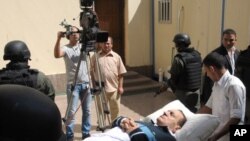An Egyptian court has postponed the trial of ousted president Hosni Mubarak until December 28 to allow another court to determine if new judges should handle the case.
Mr. Mubarak is charged with involvement in the killings of more than 800 protesters in an uprising that forced the long-serving president out of office in February.
His co-defendants include his two sons, his former interior minister and six senior security officers. All of them appeared in the Cairo court Sunday as the judges announced their decision to postpone the trial.
Lawyers for relatives of those killed in the uprising have appealed to a separate court to replace the three-judge panel in the Mubarak case. The appeals court is due to rule on that request on December 26.
In another development, Egyptian military prosecutors detained a prominent blogger Sunday, after summoning him to answer questions about his role in a deadly Cairo street battle earlier this month.
Twenty-five people were killed in the fighting October 9, mostly Coptic Christians who were protesting against an Islamist attack on a church in southern Egypt. Egyptian authorities said several security personnel were among those killed as they tried to break up the protest, which turned violent.
Military prosecutors charged blogger Alaa Abdel Fattah with inciting and participating in the violence and ordered him to be detained for 15 days pending an investigation. A second activist who appeared before the prosecutors, Bahaa Saber, faced the same charges, but was not detained.
Fattah's sister said both activists refused to answer the military prosecutors' questions because the activists believe military authorities should not be involved in their case. Egypt's military rulers have put thousands of civilians on trial in military courts since taking power from Mr. Mubarak.
Human rights groups say such military trials are unfair and result in harsh sentences.
Egypt Postpones Mubarak Trial to December




